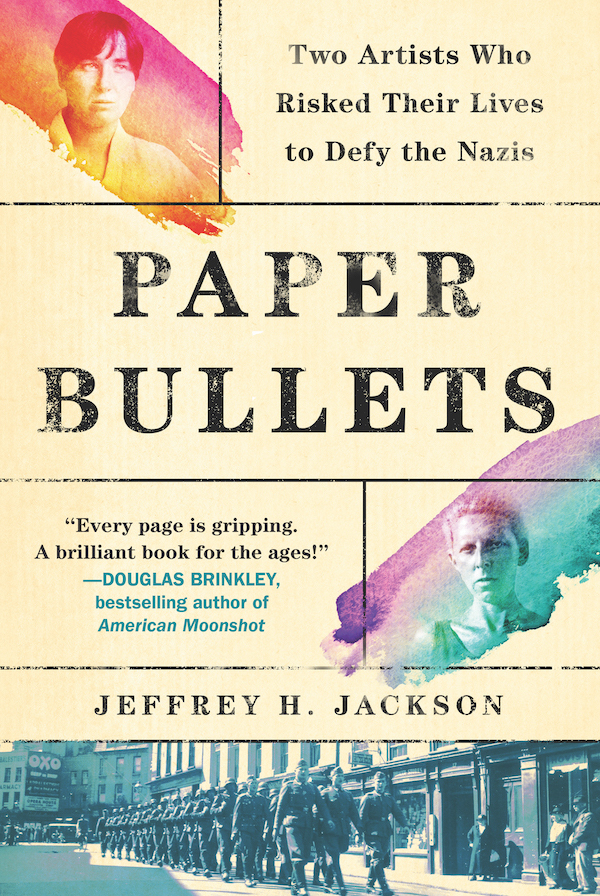Throwing the Nazis an Artistic Middle Finger: The Story of Lucy Schwob and Suzanne Malherbe
Review of Jeffery Jackson: The Artists Who Risked Their Lives Using Art to Defy the Nazis from Town Hall Seattle
Written by Teen Writer Bayla Cohen-Knott and edited by Teen Editor Lily Williamson

There are a lot of things wrong with the world right now. I don’t even have to list them; just saying ‘wrong’ and ‘world’ makes my stomach clench and a multitude of problems rush to my head. When I get these feelings and thoughts I feel overwhelmed and anxious. I feel like I have no power and I’m jealous of those who’ve figured out their plan.
It is in these times of feeling lost in what to do that it’s useful to learn about people who found creative ways to support causes they found important. A lesser-known, but striking example is the story of Lucy Schwob and Suzanne Malherbe. Their story is told by author and historian Jeffrey H. Jackson in his new book Paper Bullets: Two Artists Who Risked Their Lives to Defy the Nazis. I was lucky to hear Jackson tell part of this story at an event hosted by Town Hall Seattle. His reading of a few select excerpts from his book and continued talk put me directly in the lives of Lucy and Suzanne and made me notably curious as to what was going on in their heads.
Lucy and Suzanne are better known by their artistic aliases Claude Cahun and Marcel Moore. They lived in Paris in the 1920s where they immersed themselves in the thriving arts scene. Lucy was a writer and Suzanne was an illustrator. Together, though, they produced hundreds of photographs, often with Lucy in the male persona of Claude Cahun, that confronted traditional ideas about gender and sexual identity.

In 1937, Lucy and Suzanne moved to the island of Jersey to lead a more quiet life. That quiet life was disrupted, however, when WWII began. The Nazis saw Jersey as a strategic spot to hold and quickly took it over. Lucy and Suzanne now lived in occupied territory. This was dangerous for many reasons, but because of a few specifically. First, Lucy and Suzanne were in love. Secondly, Lucy had Jewish heritage. And thirdly, the two were communists. All three of these things made them targets of the Nazis, so they kept their lives secret, living very privately as “sisters.” These things could have scared them into submission, but instead, they motivated Lucy and Suzanne into action.
That action was passing notes. Well, not like in math class, more like to German soldiers. Lucy and Suzanne wrote hundreds of notes on little slips of paper that they then left on tables, under windshield wipers, and even in the pockets of soldiers themselves. The notes were meant to demoralize German troops. They signed the notes “The Soldier With No Name.” This gave the Nazis the idea that the notes were coming from the inside, a worrying notion. In case they were caught, they carried with them a powerful sedative to use to end their lives, instead of being killed by the Nazis. For four years Lucy and Suzanne left these notes for the soldiers and risked their lives every day to do so.
Their action was halted, however, when German police arrived on their doorstep. The Germans searched their home, uncovering incriminating evidence that they were, in fact, both “The Soldier With No Name.” Lucy and Suzanne were arrested, interrogated, put on trial, sent to prison, and sentenced to death.
Against the odds, they survived the war after nearly a year of suffering in prison. Jeffrey Jackson, the author of Paper Bullets, was able to piece together this complex history and show the reader a real look into the turmoil of wartime resistance. As Jackson said at the closing of his talk, Lucy and Suzanne show us how “small acts of protest have significance.” This story of their protest against the Nazis is one that is important to tell, especially in a time like ours where many people’s values are threatened by those in power. Learning about Lucy and Suzanne can show us how to draw on our own experiences to make change. They were motivated by their love for one another, their heritage, and their politics. They drew on their creativity as multidisciplinary artists and their experimentation with gender and sexual identity. And with that, they put together a personal rebellion to do their part in defeating the Nazis.
So, I ask you: What is something you believe in? A movement you think is important? What are your passions or interests? And how can you use your personal experience and creativity to make a difference?
To learn more about Lucy Schwob and Suzanne Malherbe and hear from author Jeffrey Jackson you can watch the recorded video of his talk with Town Hall Seattle on their website media library. The event was put together in collaboration with Third Place Books, and Paper Bullets is available for purchase through their website and in stores.
Lead photo credit: Jeffrey H. Jackson, photo courtesy of Town Hall Seattle
The TeenTix Newsroom is a group of teen writers led by the Teen Editorial Staff. For each review, Newsroom writers work individually with a teen editor to polish their writing for publication. The Teen Editorial Staff is made up of 6 teens who curate the review portion of the TeenTix blog. More information about the Teen Editorial Staff can be found HERE.
The TeenTix Press Corps promotes critical thinking, communication, and information literacy through criticism and journalism practice for teens. For more information about the Press Corps program see HERE.


